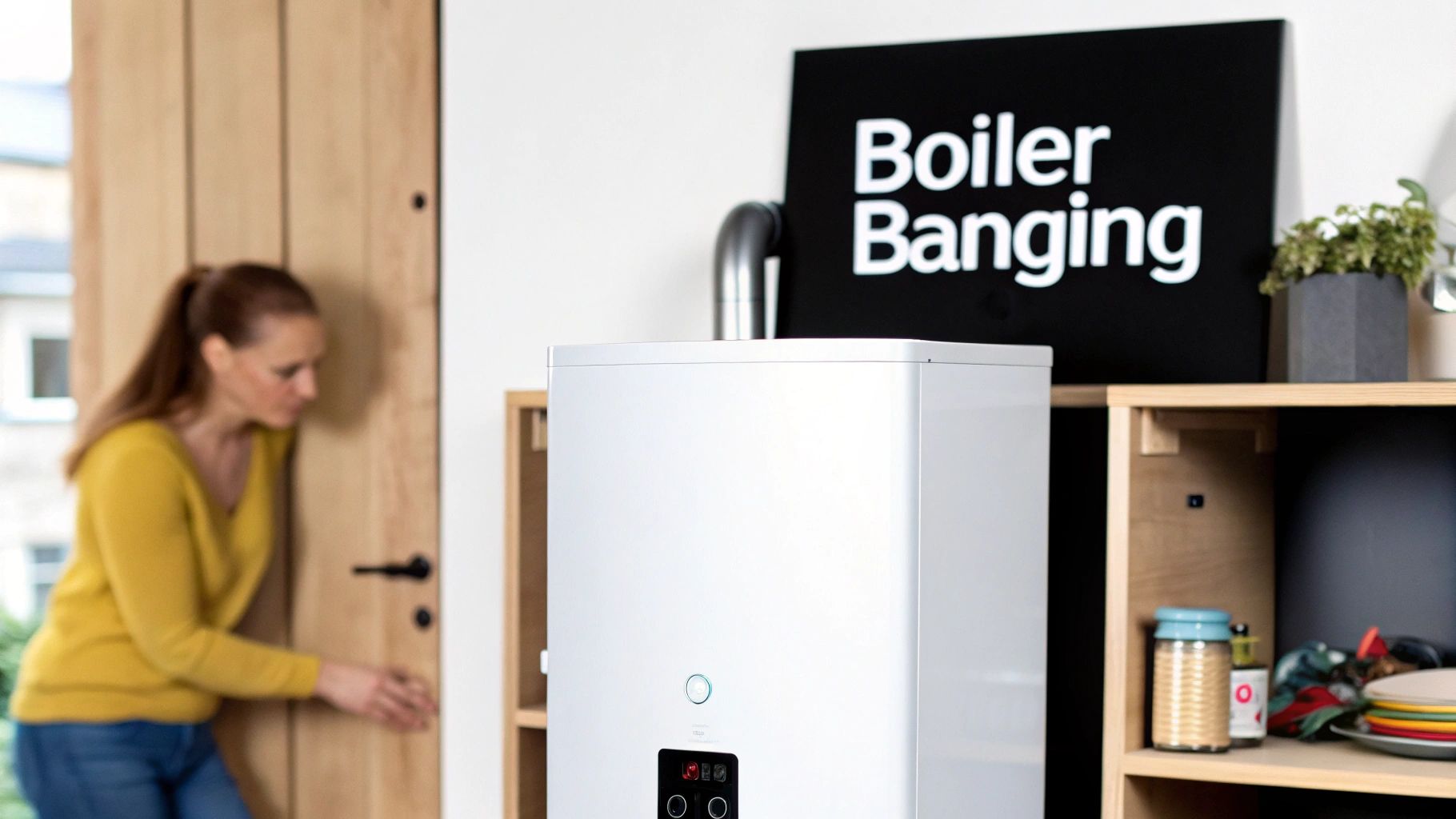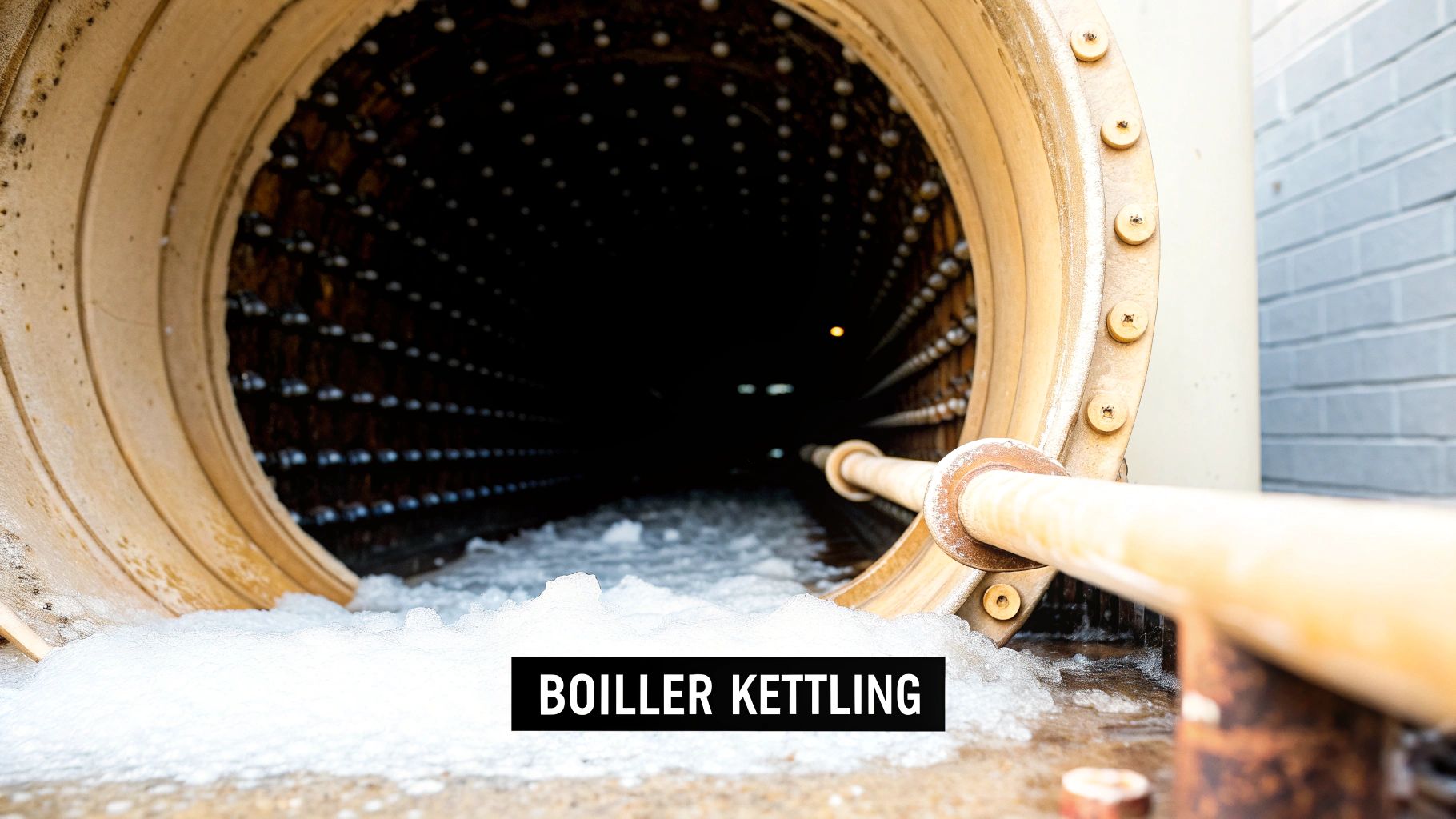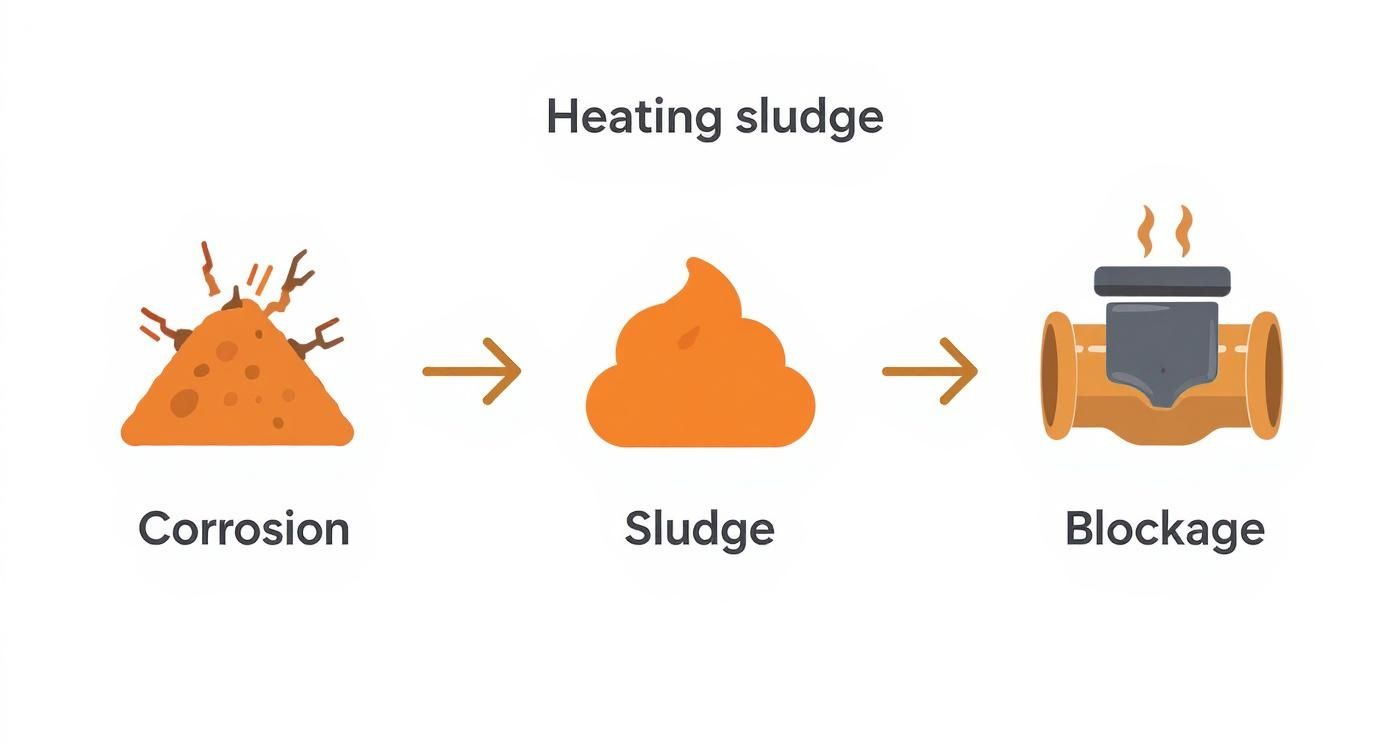Boiler making loud banging noise: causes and fixes
- Luke Yeates
- Nov 16, 2025
- 10 min read
That sudden, alarming bang from your boiler can certainly make you jump, but it’s rarely a sign that it's about to explode. Think of it as your heating system’s way of shouting for a bit of attention. Figuring out what’s causing the racket is the first step towards getting your quiet, efficient system back.
Decoding That Alarming Boiler Banging Noise

Across the UK, boiler noise is a common complaint, and loud banging is one of the top issues we hear about at Harrlie Plumbing and Heating. A healthy boiler should hum along quietly, somewhere between 35-50 decibels. Anything louder, especially a sudden bang, almost always points to an underlying problem that needs sorting.
To give you a clearer idea of what you might be hearing, here's a quick breakdown of the usual suspects.
Quick Guide to Boiler Banging Sounds
Sound Description | Potential Cause | Next Steps |
|---|---|---|
Like a boiling kettle | Kettling from limescale buildup. | Power flush the system. |
Deep gurgling or knocking | Trapped air in pipes/radiators. | Bleed your radiators. |
Random, loud bangs | Low water pressure. | Check the pressure gauge and top it up. |
Muffled, intermittent thuds | Sludge or debris in the system. | A chemical flush may be needed. |
This table should help you start to identify the noise, but let's dive into the most common causes we see.
Common Causes of Boiler Banging
Here in Eastbourne, we have notoriously hard water, which makes limescale the number one culprit. When scale builds up on the heat exchanger, it causes a problem called kettling—which sounds exactly like a boiling kettle. It’s the most frequent reason our team at Harrlie Plumbing and Heating gets called out to homes from Meads to Hampden Park.
Of course, it’s not always limescale. Other common causes include:
Low Water Pressure: If the pressure drops too low, water can't circulate properly. This leads to localised boiling, overheating, and that tell-tale banging sound.
Trapped Air: Got air pockets in your radiators or pipework? Water will struggle to flow past them, causing loud gurgling or knocking sounds as it forces its way through.
System Sludge: Over the years, rust and other debris can accumulate inside your system. This creates blockages that restrict water flow, again leading to overheating and noise.
For instance, a recent call-out to a client in the Langney area of Eastbourne revealed their boiler's racket was due to a simple pressure drop. Our Harrlie Plumbing and Heating team resolved it in under an hour, restoring peace and quiet.
Pinpointing the exact cause helps you decide what to do next. While some fixes are straightforward, others really need the skills of a Gas Safe registered engineer to make sure your home stays safe and warm.
Is Limescale Buildup Causing Boiler Kettling?
If the banging in your boiler sounds less like a hammer hitting pipework and more like a kettle rumbling just before it whistles, you’re almost certainly dealing with boiler kettling. It’s the single most common cause of a noisy boiler we see across Sussex, and that’s largely down to our notoriously hard water in places like Eastbourne.
So, what’s actually happening? Kettling is caused by a buildup of limescale—a hard, chalky deposit of calcium carbonate—which coats your boiler's heat exchanger. This layer essentially acts like an insulator, stopping heat from transferring properly to the water. Instead, it traps the heat and creates tiny, isolated hot spots on the metal itself. These super-heated spots flash-boil small pockets of water into steam. The loud banging or rumbling you’re hearing is the sound of those steam bubbles collapsing as they hit the cooler water around them.

Why Kettling Is More Than Just a Noise
That racket isn't just an annoying sound; it's a clear sign of a much bigger problem: inefficiency. Your boiler has to work far harder and burn more fuel to heat your home, which means your energy bills will inevitably start to climb.
Research into UK boiler performance has shown that a huge portion—around 30-40%—of noisy boiler complaints trace back to limescale buildup, especially in hard-water areas like ours. When that scale accumulates, it causes the overheating and collapsing steam bubbles that create the loud banging.
A perfect example was a customer we visited recently in Old Town, Eastbourne. Their energy bills had been creeping up for months, and their boiler was making a constant rumbling sound. The Harrlie Plumbing and Heating team carried out a professional descaling and system flush. Not only did the banging noise stop completely, but their bills dropped noticeably the very next quarter.
Identifying and Solving the Limescale Problem
One of the biggest giveaways of kettling is a noise that gets louder as the boiler works harder to heat your water. If you suspect this is what's causing your boiler to make a loud banging noise, the most effective fix is a professional system flush.
This process involves using specialist chemicals and equipment to circulate through your heating system, breaking down and removing the scale buildup. It restores your heat exchanger's efficiency and, most importantly, silences that noise for good. Our team at Harrlie Plumbing and Heating are experts at diagnosing and resolving kettling issues for homeowners across Eastbourne.
Could System Sludge Be the Culprit?
Over time, the inside of your central heating system can start to work against itself. Tiny particles of rust and other debris flake off from the inside of your pipes and radiators, mixing with the water to create a thick, dark muck known as central heating sludge. This isn't just slightly dirty water; it’s a major cause of serious heating problems.
When this sludge finds its way into your boiler's heat exchanger, it settles at the bottom and hardens. Much like limescale, it forms an insulating barrier, forcing the boiler to work overtime to heat the water. This process flash-boils small, trapped pockets of water, which is what causes those sudden, loud banging or rumbling sounds. A boiler making loud banging noise because of sludge is a clear sign its internal parts are under significant stress.
It's More Than Just a Racket
Sludge doesn’t just cause a disturbance; it methodically suffocates your entire heating system. As it builds up, it creates blockages that lead to those classic cold spots you might feel at the bottom of your radiators. This restriction forces your boiler’s pump to struggle, working much harder to push water through the pipes, which leads to increased wear and tear and, you guessed it, higher energy bills.
Across the UK, sludge and mineral deposits are two of the biggest culprits behind noisy boilers. In fact, various studies suggest that between 45-55% of noisy boiler issues in British homes are linked to some level of internal build-up. As components degrade, these particles circulate and create the very clicking and banging sounds that are disrupting your peace.
We see this all the time in properties across Eastbourne. A homeowner in Hampden Park called us out to look at a loud banging boiler and radiators that just weren't getting warm. A quick system check by the Harrlie Plumbing and Heating team confirmed a heavy sludge buildup that was choking the flow and putting the entire system under immense pressure.
The Most Effective Fix
If you're dealing with sludge, the most reliable and thorough solution is a professional powerflush. This isn't a simple drain-and-refill job. A powerflush uses high-velocity, low-pressure water combined with powerful cleaning chemicals to purge every last bit of sludge, rust, and debris from your pipes, radiators, and boiler.
For homeowners from Meads to the town centre, getting a powerflush from the Harrlie Plumbing and Heating team is the single best way to clear out years of accumulated gunk. It doesn’t just silence the banging; it restores proper heat distribution and can make a real dent in your heating costs. You can learn more about what a powerflush involves and how it can boost your heating system.
Checking Your Boiler Pressure and Air Locks
Sometimes, the cause of that alarming banging noise is less dramatic than a serious blockage. In many cases, it boils down to two simple culprits: the water pressure is off, or there’s air trapped somewhere in the system.
The good news is that you can often check these things yourself before you need to pick up the phone.
First things first, have a look at your boiler’s pressure gauge. When the system is cold and the heating is off, the needle should be sitting somewhere between 1 and 1.5 bar. If it’s dipped below 1 bar, there simply isn't enough water in the system to circulate properly. This can cause pockets of water to rapidly overheat and turn to steam, creating that banging or kettling sound. If you're wondering why this happens, our quick homeowner guide on boiler pressure loss can shed some light on it.
The Problem with Trapped Air
Another common issue we see in Eastbourne homes is trapped air, which creates airlocks in your radiators and pipework. That trapped pocket of air stops water from flowing freely. The banging or gurgling you hear is often the sound of water struggling to force its way past the blockage. Bleeding your radiators is a simple DIY job that can release this trapped air and solve the problem.
A quick word of caution, though. Keep an eye on that pressure gauge. UK heating engineers have found that pressure-related faults are linked to roughly 25% of banging noise cases, and that includes when the pressure is too high. This can happen if the gauge goes above 1.5 bar when cold, or shoots past 3 bar when the heating is on.
The infographic below shows how internal corrosion can create sludge, which is another frequent cause of blockages that can trap air and water.

As you can see, rust and other debris can build up inside your pipes over time, eventually leading to blockages that create symptoms very similar to a simple airlock.
While bleeding your radiators or topping up the boiler pressure often fixes the noise, be mindful if it keeps happening. If the banging comes back, or you find yourself constantly needing to bleed the radiators in your Eastbourne home, it could point to a more serious underlying problem, like a failing pump. In that case, it’s definitely time to call a Gas Safe engineer from a trusted local firm like Harrlie Plumbing and Heating to investigate properly and safely.
When You Must Call a Gas Safe Engineer
While it’s perfectly fine for a homeowner to tackle simple jobs like checking the boiler’s pressure gauge or bleeding a radiator, most causes of a loud banging noise demand a professional. Messing around with a gas boiler yourself isn’t just incredibly dangerous—it's also illegal in the UK unless you are on the Gas Safe Register.
Your safety, and that of your family, is the top priority. If you think the noise is coming from inside the boiler casing itself, or if you smell gas or spot any signs of a leak, you need to act fast. Turn off your boiler and shut off the gas supply at the meter, then call a qualified engineer straight away.
Recognising the Red Flags
Certain symptoms are clear giveaways that it's time to get an expert involved. Ignoring them won't make the problem go away; in fact, it often leads to much bigger issues and puts your household at risk.
Keep an eye out for these warning signs:
The banging is getting louder or happening more often.
Your boiler keeps losing pressure, even after you’ve topped it up.
You can see scorch marks, soot, or damp patches on or around the boiler.
The pilot light (if your boiler has one) keeps going out or burns with a weak, yellow flame instead of a crisp blue one.
The cost of putting off a repair can be significant. Minor issues can quickly escalate into a full boiler breakdown, and in the UK, diagnostic work alone can average £150-£300 per callout. It really does pay to be proactive.
For those of us in Eastbourne, it’s always best to use a local, reputable company like Harrlie Plumbing and Heating. Our Gas Safe engineers are familiar with the specific challenges in our area, from the hard water scale that’s common in Sovereign Harbour properties to the older pipework found in many homes across the town.
We can get to the root of the problem quickly and make sure your system is running safely and efficiently. Regular maintenance is the best prevention, so it might be worth having a look at our Eastbourne homeowner guide on servicing a boiler.
Your Banging Boiler Questions, Answered
A boiler making a racket can be pretty unsettling. We get it. To put your mind at ease, our engineers at Harrlie Plumbing and Heating have pulled together answers to the questions we hear most often from homeowners around Eastbourne.
Is a Banging Boiler Dangerous?
Let's be clear: a boiler explosion is incredibly rare. However, that loud banging is your system's way of shouting for help.
Ignoring it can cause serious damage to key components, eventually leading to a complete breakdown. Some causes, like a faulty thermostat, can even lead to overheating. The safest bet is always to get it checked out by a Gas Safe registered engineer.
How Much Does It Cost to Fix?
This really depends on what’s causing the racket. A simple fix like re-pressurising the system might just be part of a standard call-out fee, which usually runs between £75-£150.
If the problem is a serious build-up of sludge—a common headache here in Eastbourne—a professional powerflush could be needed, typically costing from £300 to £600. Here at Harrlie Plumbing and Heating, we believe in being upfront, so we’ll always give you a clear, transparent quote before we pick up a single tool.
Can I Fix My Banging Boiler Myself?
There are a couple of things you can safely do yourself. Checking the boiler's pressure gauge and bleeding your radiators are good first steps. If you notice the pressure is low, topping it up according to your manufacturer's instructions is usually a straightforward job for a homeowner.
But—and this is a big but—if you suspect the problem is limescale, sludge, or anything to do with the boiler's internal parts, you need to call in a professional. Never try to remove your boiler’s casing yourself. It’s not just dangerous; it’s illegal. The Harrlie Plumbing and Heating team is always on hand to help Eastbourne residents with these complex issues.
How Can I Prevent Banging in the Future?
An annual service from a Gas Safe engineer is your single best defence against future problems. It’s like an MOT for your heating system.
For homes in hard water areas like ours in Eastbourne, installing a magnetic system filter is a great move. It acts like a trap, catching sludge and debris before it can build up inside the boiler. A limescale inhibitor can also make a real difference. Our team can take a look at your setup and recommend the best preventative measures to keep your system running quietly and efficiently for years.
If a noisy boiler is ruining your peace and quiet, don't wait for a small problem to become a big, expensive one. Contact the local experts at Harrlie Plumbing and Heating for a fast, reliable, and safe solution. Get your free quote today!

Comments